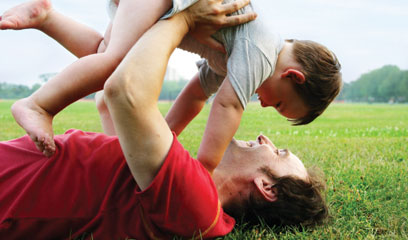 Not to downplay the challenges of being a new mom, but becoming a new dad presents its own set of obstacles and surprises -- and fewer resources to help you along.
Not to downplay the challenges of being a new mom, but becoming a new dad presents its own set of obstacles and surprises -- and fewer resources to help you along.
Chuck Ault sees this first hand, as the national training director of Boot Camp for New Dads, which is offered in Everett, Puyallup and Olympia, plus more than 200 other locations nationwide.
I asked Ault about the biggest concerns that new dads bring to Boot Camp. "At the top of the list is a fear of dropping the baby, breaking the baby, those kinds of things," Ault says. "Another category has to do with the new dad himself. What's he going to lose as a result of having a child? Dads are concerned about their free time, work, finances."
During Boot Camp, Ault says, dads-to-be spend three hours with an instructor and a team of "veteran dads." The veterans are previous Boot Camp attendees who return with their 3-month-old babies. All dads that attend Boot Camp class are invited to come back as a veteran, and about one-third of the dads do so.
In addition to talking with Ault, I interviewed other parenting advice experts and local dads to get their take on what new fathers should know. They offered plenty of advice, as well as ideas on where new dads can turn for help. I also drew on my own experience with my daughter Iris (now 2 1/2). After all, as one dad put it, it only takes a few months with your first kid before you consider yourself the ultimate parenting expert.
Time management skills for parents
"The hardest thing is finding time for your spouse and yourself," says dad Marc Wilson, who lives in Kirkland with his wife Jennifer and their two sons, Ty (3 1/2 years) and Trevor (3 weeks). "I work out of the house and my wife is a full-time stay-at-home mom, and the reality is that as a dad I'm number four on the list right now. It's not a bad thing; it's just the way it is."
His words are echoed by father Paul Nicholson of Woodinville. He and his wife Kelli are the parents of Benjamin, 8 1/2 months. "Kelli and Benjamin get up around 7 and I see them just long enough to say good morning and goodbye," Nicholson says. "The alternative -- hanging around to have breakfast with them -- would mean I get home later in the evening. Either way I lose."
Randy Doyle, who lives in Orting with his wife Lisa and son Caydon, 22 months, teaches the Boot Camp class at Good Samaritan. He also mentioned free time as the biggest new-dad shocker. "You don't factor that into your life, because obviously your life ahead of time is already filled completely with things," Doyle says. "And then you have a child and all of a sudden this kind of bumps in the way of those things, and you have to jostle your life around."
Unlike learning how to change a diaper or hold the baby, this is not the kind of problem with an easy solution. If you feel like your time management skills need work, now is the time to sharpen them up.
Don't get left behind
Many new parents find that even if they had a modern relationship before the baby is born -- you know, shared housework, two incomes -- it's easy for moms and dads to slip into traditional sex roles once the new baby comes home.
While that works for many families, if your goal is to balance parenting responsibilities, you have to start planning for it before the baby is born. "Jump in with both feet from the very beginning," Ault says. "If you flinch at all, you've sort of already started out behind where you need to be. That begins in the hospital. For some, it begins prenatally."
Consider reading baby books -- about pregnancy, childbirth, newborns, breastfeeding, the works -- before the baby is born. You'll have no time to read books after the birth, but even if you forget half of what you read, you'll be primed for baby troubleshooting.
Of course, books can only teach you so much. "Hearing about a baby just isn't the same as experiencing it firsthand," Nicholson says.
Wilson agrees. "It's something you've got to experience firsthand to know how to react to things, but I don't feel it's been as difficult now, three-and-a-half years later, as I probably thought it was going to be," he says. "Check with me in another three-and-a-half years." Still, adds the veteran dad of two, "I definitely think it's easier" becoming a dad the second time around.
You'll find a niche
"Kelli was adamant from the start that I play some part in parenting," Nicholson says, "and the assignment she gave me was to change diapers. I'd get up a couple times every night to change Benjamin's diaper."
Doyle had a similar assignment. "I tried to take one feeding during the night when the baby was feeding all the time, to give [my wife] about a four hour stretch of sleep. That was a really good balancing thing for us."
Note: If you're expecting a baby, and a four-hour stretch of sleep doesn't sound impressive, trust me that soon you will be ready to kill for two hours.
Doyle's wife suffered from postpartum depression, and this was another area where he had to take charge. "If I was an expert in anything," he says, "it was trying to keep the family aimed in a steadfast direction while she was going through that."
Remember that mistakes will be made. "We did silly things like called 911 when we thought our first son was having a tough time breathing," Wilson says. "You know, 11:30 at night and the medics get here, and they said to us, 'Oh, new parents?'"
The rewards are there if rare
Soon, that baby will smile, make eye contact and roll over. Newborn babies do none of these things. My daughter almost never smiled until she was 3 months old. We called her the Ice Princess. But that made the occasional smile or happy gurgle that much more rewarding.
Nicholson puts it this way: "Even though to a casual observer Benjamin was just a newborn, for me there was something special going on all the time."
Matthew Amster-Burton is a Seattle food writer. Find him online at rootsandgrubs.com.
How dads can help with breastfeeding
Getting started with breastfeeding is hard -- the majority of women run into challenges -- but dads can help with everything breastfeeding-related except the actual milk delivery. "Don't count yourself out on that breastfeeding experience," cautions Chuck Ault, national training director of Boot Camp for New Dads.
For example, when my daughter couldn't seem to latch on and my wife was in a lot of pain, I had no idea how to help. But I did have some phone numbers. We made several calls to the lactation help line at Swedish Hospital (206-386-MOMS -- available only to Swedish patients -- but most hospitals have their own help line) and got useful advice. But we needed hands-on help, so Swedish sent Judy Herrigel, a lactation consultant.
Herrigel spent an hour at our home, recommending a new nursing pillow and different positions to make nursing less painful. She also explained that it's common for babies to have trouble finding the nipple, and although it's extremely frustrating, Iris would get the hang of it. (Herrigel was right.) Lactation consultants are also equipped to deal with more difficult problems, like low milk supply or infections. A home visit is $150, or you can bring your baby into the clinic at the Community Birth and Family Center for $90.
"A mistake would have been to call in the lactation consultant and then not participate in that visit," Ault adds. "You'll remember a lot more than she [the mom] does of the visit."
I called Herrigel to thank her and ask her what else dads can do to help with breastfeeding. "Making it really easy for the woman to have water or liquids by her side, giving her something to eat," she says. "My husband used to change the baby and bring the baby to me. If the woman is pumping, dads can help to wash up the breast pump parts and warm it up. Or hold the baby if she has to pump after a feeding."
Or dads can hold the baby afterward in any case. "Just after she breastfeeds, I keep Trevor with me while Jennifer goes up and gets a nap in or just has some time to herself," Wilson says.
Ault agrees. "One of the way dads can bond is to sit beside her while she's feeding and be the burping expert," he says.
Resources
Boot Camp for New Dads, offered at these Puget Sound locations:
- Good Samaritan Community Healthcare
Monthly class
407 14th Ave. S.E., Puyallup
253-697-5300 - Providence Everett Medical Center
Monthly class
Family Resource Center
916 Pacific Ave., Everett
To register, call 425-304-6000 - Providence St. Peter Hospital
Every other month class
413 Lilly Road N.W., Olympia
866-770-BABY
The Conscious Fathering Program:
Provides dads with infant care skills while stressing the benefits of responsible fatherhood. The program is currently available at the following locations:
- Auburn Regional Medical Center, 253-333-2522
- Bates Technical Institute, 253-680-7500
- Family Education Services, 360-754-7629
- Gracewinds Perinatal Services, 206-781-9871
- Highline Community Hospital, 206-439-5576
- Northwest Hospital, 206-781-9871
- Overlake Hospital, 425-688-5259
- Swedish Hospital Ballard, 206-251-3338
- Swedish Hospital First Hill, 206-251-3338
First Weeks: Drop-in group for parents with infants up to 12 weeks
Community Birth and Family Center
2200 24th Ave. E., Seattle
206-720-0511
Lacatation Consultant Hotline
Home visit: $150
Clinic visit: $90
206-615-8078
Program for Early Parent Support (PEPS)
Groups form regularly
206-547-8570, Ext. 10
Family Help Line: Free parenting information, referrals and support
Offered by Parent Trust for Washington Children 800-932-4673
Drop-in Fatherhood Group
North Seattle Family Center
3200 N.E. 125th St., Seattle
206-364-7930
2nd and 4th Wednesdays, 6-7:30 p.m., free
Books
Pregnancy:
Pregnancy, Childbirth, and the Newborn, by Penny Simkin, Janet Whalley and Ann Keppler
The Pregnancy Book, by William Sears
General baby care:
Baby 411, by Denise Fields and Ari Brown
The New Basics, by Michel Cohen
Fathering:
Hit the Ground Crawling, by Greg Bishop (available from newdads.com)
Breastfeeding:
The Nursing Mother's Companion, by Kathleen Huggins
Time management:
Getting Things Done, by David Allen
Originally published in the October, 2006 print edition of ParentMap.









